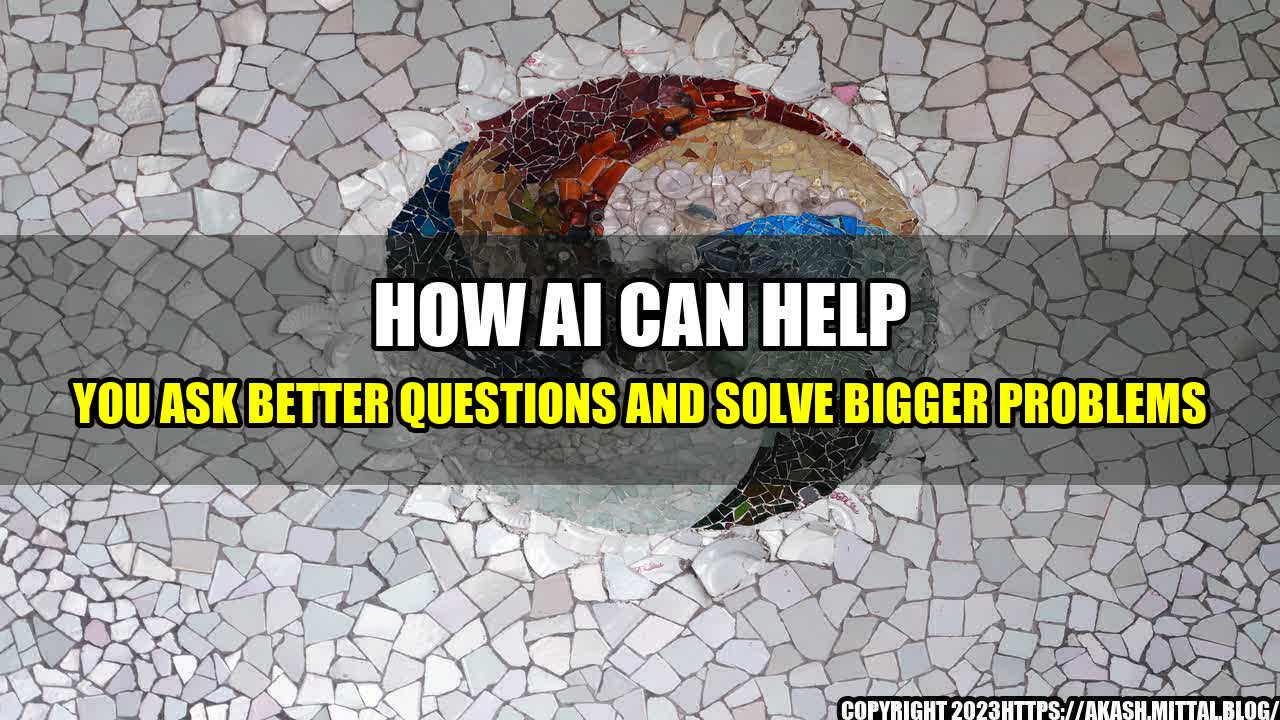How AI Can Help You Ask Better Questions and Solve Bigger Problems


Have you ever been in a situation where you needed to solve a problem or get an answer, but you just didn't know how to start? Maybe you felt overwhelmed by the complexity of the problem, or maybe you just didn't have enough information to make an informed decision. If so, you're not alone. Many people struggle with asking the right questions and finding the best solutions.

Photo by Austin Distel on Unsplash
However, with the help of AI (Artificial Intelligence), you can improve your problem-solving and question-asking skills significantly. AI has the ability to analyze large amounts of data, identify patterns and trends, and make predictions, which can help you make more informed decisions and ask better questions. In this article, we'll explore how AI can help you solve bigger problems and ask better questions.
One of the most significant advantages of using AI for problem-solving and question-asking is its ability to analyze large amounts of data quickly and accurately. For example, suppose you're trying to understand the factors that influence consumer behavior. In that case, AI can analyze vast amounts of consumer data, such as purchase history, browsing behavior, social media activity, and demographic information, to identify patterns and trends that could help you formulate hypotheses and make informed decisions.
A real-life example of this is Netflix's recommendation system. Netflix uses AI algorithms to analyze users' watching behavior and suggest movies and TV shows that they may like based on their viewing history and preferences. According to Netflix, their recommendation system is responsible for 80% of the content watched on their platform.
"AI can analyze vast amounts of consumer data, such as purchase history, browsing behavior, social media activity, and demographic information, to identify patterns and trends."
Another example is the healthcare industry, where AI is used to analyze medical data, such as patient records, clinical trials, and disease outbreaks. AI-powered systems can help doctors and researchers identify new treatments, predict disease outbreaks, and improve patient outcomes.
Another way AI can help you solve bigger problems and ask better questions is by automating tasks that would otherwise take up valuable time and resources. For example, suppose you're a business owner trying to analyze customer feedback. In that case, you could use AI-powered sentiment analysis tools to quickly and automatically categorize customer feedback into positive, negative, or neutral categories. This would save you time and help you focus your efforts on addressing customer concerns that require attention.
Another example is the legal industry, where AI-powered tools can help lawyers automate mundane tasks, such as document review and contract analysis. This frees up time for lawyers to focus on more complex tasks, such as legal research and strategy.
By automating mundane tasks, AI can help you be more productive and efficient, allowing you to focus on more complex and important tasks.
Finally, AI can help you ask better questions by identifying patterns and trends that you may not have noticed otherwise. For example, suppose you're a marketer trying to understand your audience better. In that case, you could use AI to analyze social media data, such as likes, shares, and comments, to identify the types of content that resonate most with your audience. This could help you create content that is more engaging and relevant to your target audience.
Another example is the finance industry, where AI-powered trading systems can identify patterns and trends in financial data, such as stock prices and exchange rates, to make more informed trading decisions.
By identifying patterns and trends, AI can help you ask better questions and make more informed decisions. This can lead to better outcomes and more significant impact.
Curated by Team Akash.Mittal.Blog
Share on Twitter Share on LinkedIn